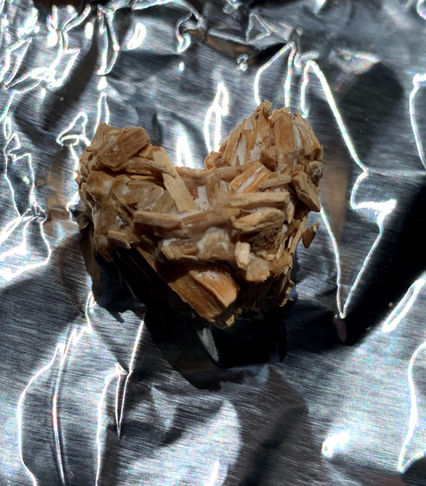On MyCo Fashion
There are a variety of sustainable biomass sources that have been used in fashion, including bioplastic, kombucha, and a variety of starches [41]. For example, AlgiKnit’s seaweed yarn [3], Vollebak’s wood pulp and algae shirt [42], the EcoRain Poncho made from a sugarcane-based bioplastic [10]. Unlike these materials, mycelium is uniquely suited for wearables due to its strength, light weight, shape-ability, water resistance, and thermal resistance and ‘Do It Yourself’ qualities.
In this work, we chose to elaborate on the idea of mycelium accessories, which were initially tackled by a group from the University of California, Davis. While the Davis team decided to make large pieces with embedded electronics [41], we chose to create more usable and fashionable jewelry for everyday
wear. To accomplish this, we grew a pair of stud earrings, a pair of hanging earrings, a teardrop-shaped pendant, and a heart-shaped pendant. These pieces were inspired by popular, minimalist styles that are commonly seen at department stores.
Small metal pieces were used to complete the jewelry like the necklace chain and earring backings. While these additions are not biodegradable, they add functionality, and durability to the pieces. When the pieces are no longer wanted, the mycelium components can be composted, while the metal parts can easily be removed and reused for new pieces, highlighting the importance that both composting and recycling have on our material waste.
In our current world of fast fashion, pieces quickly go in and out of style, going from the traditional two seasons (Spring/Summer and Fall/Winter) to over 52 "micro-seasons" per year [2]. While there are many issues concerning this trend, eco-friendly brands can adapt to this new reality in a positive way by creating pieces that can be composted, recycled, or re-used. In this case, we provide insight into how mycelium could be used as a sustainable material in the world of fashion.
Molds
Tools
-
Sculpey clay
-
Jewelry (Pendant and Earrings)
-
Sewing needle
-
Pendant chain, wire, or string
-
Earring backings or hooks
Mycelium
Materials
Step two
Step three
Step four
Step five
Step one
1
2
3
4
5
6
1
2
Mold Creation Process
Roll out Sculpey clay out so that it is approximately 2cm thick
Take jewelry (pendant, earrings, ring, bracelet, etc.) and press into clay
Carefully remove jewelry from clay
Preheat oven to 120C°/250F°
Bake clay molds for 15 minutes
Remove from oven and let cool
Final Artifact Process
Pendants: Create a small hole with a sewing needle in the top of the pendant and attach a chain, wire, or string of your choosing
Earrings: Glue metal backings or hooks to the earrings










